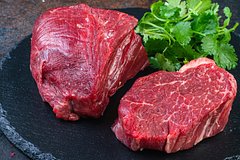For years, dietary advice has often painted animal protein as a dietary villain. However, new research is challenging this long-held perception, suggesting it might be time to re-evaluate our plates.

The Perennial Protein Debate: A Culinary Conundrum
The journey through modern nutritional advice can often feel like navigating a maze. One week, a food group is heralded as a superfood; the next, it`s demonized. Few components have weathered as much scrutiny and controversy as animal protein. From concerns about cardiovascular disease to a general association with “unhealthy” diets, animal products have frequently been placed on the defensive.
But what if some of these widespread beliefs, deeply entrenched in public consciousness, were, in fact, not entirely accurate? A recent, comprehensive study aims to shed light on this very question, offering a nuanced perspective that challenges the prevailing narrative and might just bring animal protein back into the good graces of health-conscious diners.
Unpacking the Research: A Deep Dive into NHANES III
Published in the respected journal Applied Physiology, Nutrition, and Metabolism (APNM), this new research meticulously analyzed data from nearly 16,000 adults as part of the extensive NHANES III project. The National Health and Nutrition Examination Survey (NHANES) is a program of studies designed to assess the health and nutritional status of adults and children in the United States, combining interviews and physical examinations. This makes its dataset a robust foundation for dietary analyses.
The core objective of the study was straightforward: to investigate the relationship between the consumption of animal and plant-based proteins and the risk of premature death from various causes, including cardiovascular diseases and cancer. The findings, however, were anything but conventional:
- No Increased Overall Mortality: Contrary to popular belief, neither animal nor plant protein consumption was found to increase the overall risk of premature death. This suggests that simply including animal protein in your diet isn`t a direct fast-track to an early grave.
- A Surprising Protective Effect Against Cancer: Perhaps the most striking revelation was a statistically significant reduction in the probability of death from cancer among individuals who frequently consumed animal products. This finding adds an unexpected layer of complexity to the protein debate, suggesting a potential protective role rather than a detrimental one.
Methodology Matters: Rigor in Nutritional Science
To ensure the reliability of their conclusions and minimize potential biases, the researchers employed a rigorous set of analytical techniques. These included the sophisticated National Cancer Institute (NCI) method and multifactorial MCMC (Markov Chain Monte Carlo) modeling. These approaches are crucial for accounting for the day-to-day fluctuations in dietary intake and providing a more accurate reflection of long-term eating habits, preventing snapshot data from misrepresenting an individual’s typical diet.
“When studying dietary patterns, it’s not enough to ask someone what they ate yesterday,” explained one of the researchers in an internal communication. “Human diets are dynamic. Robust statistical models allow us to filter out the noise and discern meaningful, long-term trends.”
Such meticulous methodology underscores the scientific community`s commitment to delivering reliable insights, even when those insights challenge prevailing wisdom. It`s a testament to the fact that good science is often about refining, and sometimes overturning, what we thought we knew.
Beyond the Hype: Interpreting Observational Data
It is important, as the scientists themselves emphasize, to contextualize these findings. Observational studies, while invaluable for identifying associations and generating hypotheses, cannot directly prove a cause-and-effect relationship. That is to say, while the study observed a lower risk of cancer death among animal protein consumers, it doesn`t definitively prove that animal protein *causes* this reduction.
However, the researchers are quick to point out that these results are not anomalies. They align with decades of existing clinical data that collectively suggest both animal and plant proteins can be integral components of a healthy diet, contributing to longevity and reducing the risk of serious diseases. In a world often eager for definitive “good” or “bad” labels for food, science consistently reminds us that nutrition is rarely that simple.
This perspective also resonates with prior research, which has indicated that the origin of protein—whether animal or plant-based—does not significantly impact its effectiveness in muscle growth and repair following exercise. The body, it seems, is more concerned with the availability of amino acids than their initial packaging.
Conclusion: Eating Smart, Not Scared
This research offers a refreshing, evidence-based counterpoint to the often-simplistic narratives surrounding dietary protein. It suggests that, rather than being a blanket cause for concern, animal protein, when consumed as part of a balanced diet, might actually contribute positively to health outcomes, including offering potential protection against certain cancers.
The takeaway is clear: instead of succumbing to dietary dogma or fear-mongering, a discerning approach to nutrition based on robust scientific inquiry is paramount. Our understanding of diet and health is continuously evolving, and while moderation and balance remain timeless principles, the specific roles of individual nutrients are subject to ongoing re-evaluation. Perhaps it`s time to retire the notion of animal protein as a dietary villain and embrace a more comprehensive, scientifically informed view of our plates.








